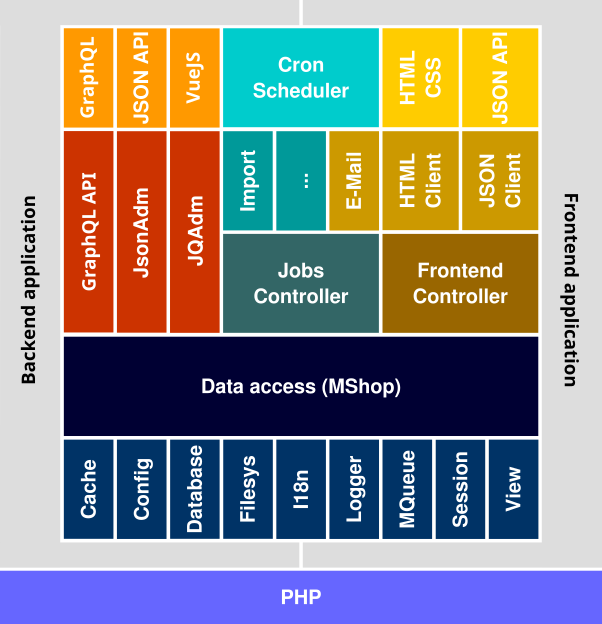Architecture
The most important thing this image should make clear is that Aimeos needs a host application where it can be integrated. Contrary to other e-commerce systems, Aimeos is first of all no stand-alone software. Instead, it can be used with any PHP framework or existing application where it can be integrated as native package.

For details about the structure of the Aimeos database, please have a look at the SVG file of the ERM diagram for the Aimeos database layout.
Administration endpoints#
These are the endpoints editors and developers will interact with over HTTP.
JQAdm interface#
Standard Aimeos admin interface for managing all data that is required or generated in Aimeos.
Code: ai-admin-jqadm extension
GraphQL API#
GraphQL API for retrieving and managing add shop data from remote or from the JQAdm interface.
Code: ai-admin-graphql extension
JsonAdm API (deprecated)#
JSON REST API for retrieving and managing add shop data from remote or from the JQAdm interface.
Code: ai-admin-jsonadm extension
Client endpoints#
These are the endpoints customers and developers will interact with over HTTP.
HTML client#
Standard HTML frontend including product and account views, checkout process and creating e-mails.
Code: ai-client-html extension
JsonApi client#
Full featured JSON REST API for creating custom frontends or enhancing the HTML client by dynamic features.
Code: ai-client-jsonapi extension
Controllers#
These aren't MVC controllers but business logic controllers instead. That means, they know what is to do if a product should be put into the basket for example.
Frontend controllers#
Business logic for everything the different client implementions need. They offer an easy to use interface to retrieve categories, products, services, etc. and manage the basket resp. create the order if requested.
Code: ai-controller-frontend extension
The domain controllers are:
- attribute : Search an retrieve available (product) attributes
- basket : Manage one or more baskets
- catalog : Retrieve catalog tree or tree parts
- customer : Get and save own data of each customer
- locale : Fetch available language/currency combinations
- order : Create order and retrieve existing ones for each customer
- product : Search and filter products
- review : Add and fetch customer reviews
- service : For getting delivery and payment options
- site : Retrive sites or tree of sites
- stock : Retrieve the current stock levels for the products
- subscription : Manage recurring product subscriptions
- supplier : Retrieve and filter available suppliers
Job controllers#
All task that need to be executed in an asynchronically because they should be decoupled from the fontend for speed or error resilience.
Code: ai-controller-jobs extension
Jobs care about:
- Administrative cleanup tasks
- Data import and export
- Product index management
- Mass media scaling
- Updating order status from exernal sources
- Subscription handling
- Sending e-mails
Data access#
The second layer offers access to the data stored in relational database systems, NoSQL databases or provided by external (HTTP) APIs. It doesn't matter where the data is stored, the data access layer provides the same PHP API and semantics to the layers above regardless of the source. The implementation is located in the Aimeos core or in extensions.
Aimeos is build on the principles of the domain driven design (DDD) and each data domain is self-contained. Within the access layer, separate domains care about specific data, e.g. the product domain manages only the product data while the order domain only cares about order data. There are currently 16 domains available that can be replaced by own implementations for different data sources.
Code: Aimeos core
Admin related domains:
- cache : Key/value cache for storing e.g. HTML blocks
- job : Job queue
- log : Access to log data
Shop domains:
- attribute : Attributes that can be attached to products, services, media, etc.
- catalog : Categories and product references
- coupon : Coupon configuration and code for rebate systems
- customer : Access to customer related data
- index : Product index for fast searching and filtering
- locale : Site, language and currency related data
- media : Images, documents and files referenced by other domains
- order : Complete order related data
- plugin : Basket plugin setup and configuration
- price : Prices referenced by other domains
- product : Base product data
- review : Product reviews
- rule : Dynamic price rules
- service : Delivery and payment provider implementations
- stock : Product stock levels
- subscription : Recurring subscriptions
- supplier : Product supplier related data
- tag : Tags for all items with a list table
- text : All kind of texts referenced by other domains
Due to the strict separation it's possible to store each data in a separate domain database.
Adapters#
The bottom layer in the Aimeos stack contains the adapters to integrate the e-commerce components into the host application or to provide common interfaces for implementations. They exist in the "Aimeos\Base" namespace located in the Aimeos base or in extensions if they offer specific integrations.
Code: Aimeos base
Adapters for integration into the host application:
- Cache : Use the caching infrastructure
- Config : Configure Aimeos using the application
- Logger : Logging messages to a shared facility
- Mail : Sending e-mails if available
- Password : Password handling adapter
- Session : Shared user sessions
- View : Template engine
Interfaces where often no host implementation exists or it's not reasonable:
- DB : Database abstraction layer (DBAL and PDO available)
- Criteria : Query builder for searching and filtering
- Filesystem : Local and cloud based file access (FlySystem extension available)
- MQueue : Offload resource intensive tasks (extension for RabbitMQ, Beanstask and Stomp available)
- Process : Parallel processing of tasks
- Translation : Translation handling (Gettext extension available)